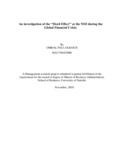An investigation of the ''Herd Effect'' at the NSE during the global financial crisis
| dc.contributor.author | Ombai, Paul O | |
| dc.date.accessioned | 2012-11-13T12:37:46Z | |
| dc.date.available | 2012-11-13T12:37:46Z | |
| dc.date.issued | 2010 | |
| dc.identifier.uri | http://erepository.uonbi.ac.ke:8080/handle/123456789/5842 | |
| dc.description.abstract | The NSE 20 share Index constituents generally witnessed decreased mean returns on the aftermath of the global credit crunch. As a result the NSE 20 share Index also registered a decline in returns in the post credit crunch period. The existence of such a phenomenon can in part be attributed to less than rational aspects of investor behavior and human judgment. Behavioral finance provided a fundamental theoretical framework for this study. The general dip in returns of stocks comprising the NSE 20 share index coupled with the decline in returns in the NSE 20 share index itself was a pointer to the existence of herding behavior. Subsequently, regression analysis undertaken indicated that the coefficient y2 was significant and negative in the period after the global financial crisis only, thus giving strong indication that herding behavior was prevalent at the NSE as a psychological response by stock investors to the global financial crisis. | en_US |
| dc.language.iso | en_US | en_US |
| dc.publisher | University of Nairobi, Kenya | en_US |
| dc.title | An investigation of the ''Herd Effect'' at the NSE during the global financial crisis | en_US |
| dc.title.alternative | Thesis (MBA) | en_US |
| dc.type | Thesis | en_US |

